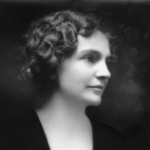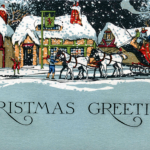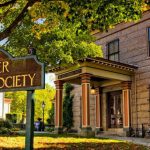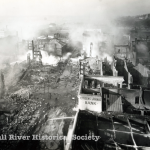It is a brilliant book and in my estimation the definitive text on the history of the textile manufacturing industry that was Fall River.
The book: American Textile Colossus by Jay J. Lambert.
It is, as the subtitle states: The Story of Fall River, Massachusetts, its Cotton Manufacturing Industry, and its People.
Emphasis on the word The.
Why?
Because it is unsurpassed in the annals of written Fall River history, fully documenting the story of the city’s textile industry from its commencement, to its stratospheric rise, and inevitable decline. Told in compelling, highly readable prose, it includes the story of Fall River’s mill owners and its multi-cultural work force, immigration, neighborhoods, and the strife and labor discontent that resulted in the formation of labor organizations. It is a thought-provoking, sweeping history, unsurpassed in scope and content.
Perhaps the book is best described in the closing paragraph of the author’s Introduction:
This present history is a modest effort to understand Fall River’s role in [the story of the New England cotton industry]. It is not nostalgia for a hard and grimy past. Presumably, there is no chance of creeping revisionism for a tradition of low wages, poor working conditions, and unpredictable employment. There is a reality we have to accept: this is not Pawtucket, which can claim the first workable Arkwright textile machinery in this country; nor Lowell, with the first fully integrated mills run by the “Lowell girls”; nor New Bedford, which can look back to the romance of its whaling days. There was a reason why Jonathan Thayer Lincoln, Fall River descendant of mill owners and Harvard academic, titled his two books, City of the Dinner-Pail (1909), and The Factory (1912), and a 1920 article in The National Geographic Magazine could identify the city as “America’s Foremost Mill Town.” For its more realistic residents, it has never had any other pretentions.
In a decade of painstaking research and writing, the author never donned rose-colored glasses; revisionist history it is not.
But in truth, I do have one dispute with the author – a major disagreement, to be sure – this work, with 634 pages of text and 170 pages of endnotes and index, is far from a “modest” effort.
Herculean is an appellation far more suitable.
And what of the author?
Jay is a Fall River boy born and bred – he grew up in the shadow of the Wampanoag and Flint Mills – and is descended from English and French-Canadian ancestors who immigrated to Fall River for better opportunities and employment in the city’s mills.
Following retirement from a successful career as a trial lawyer in Philadelphia, Jay and his wife, Barbara, returned to New England. Interest in his heritage was the nucleus of a project that morphed into American Textile Colossus; conceived for personal satisfaction, it emerged as a definitive work.
Research brought him to the FRHS. Jay became increasingly active in the organization and accepted a position on the board of directors; he currently serves as president.
American Textile Colossus is a major contribution to the local history and textile manufacturing genres and is a must-read for anyone interested in the subject, or for the descendants of those intrepid immigrants who were its life blood.
It is also represents a major contribution to the FRHS.
Why?
Because Jay generously donated 100% of his authorship rights to the museum, allowing it to be published by the Fall River Historical Society Press.
Additionally, Jay and Barbara funded the complete design, lay-out, and production costs associated with all aspects of the publication, thus ensuring that all proceeds fully benefit the FRHS.
American Textile Colossus is available in two editions and can be purchased in the Museum Shop or online by visiting https://lizzieborden.org/FRHSPress/.
Paperback; $28.95
Limited collector’s edition of 100 hardbound copies; $100.00
Due to social-distancing protocols it was impossible to safely hold a book signing, but Jay – as always, very accommodating – willingly autographed both editions, so all copies retailed by the FRHS are author signed.
The FRHS is indebted to Jay and Barbara for their interest and very generous support.
Congratulations, Jay!








